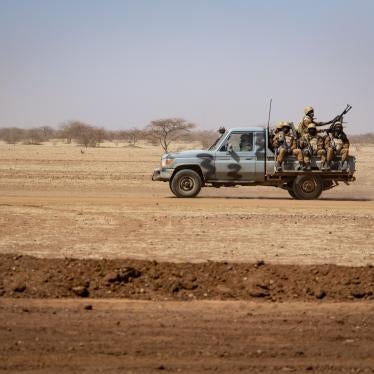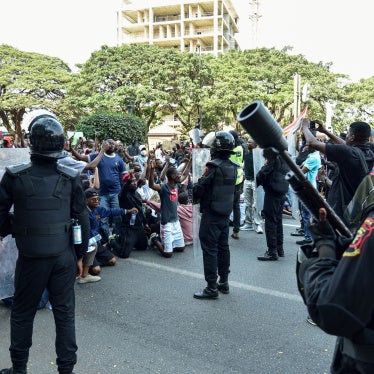Human Rights Watch today accused the Democratic Republic of Congo of violating its promise to the United Nations not to carry out the death penalty on convicted criminals.
In a letter to Congo President Laurent Kabila, Human Rights Watch urged him to abide by his own government's pledges and immediately suspend any further executions ordered by the Court of Military Order.
"These kinds of wholesale executions should not go forward under any circumstances," said Peter Takirambudde, the Director for Africa at Human Rights Watch, "but they should certainly not go forward in light of President Kabila's repeated promises to suspend the death penalty."
BACKGROUND REPORT ON THE COURT OF MILITARY ORDER IN THE DEMOCRATIC REPUBLIC OF THE CONGO
The Court of Military Order was established in 1997 by presidential decree law No. 019 shortly after President Laurent Kabila's government seized power in the Democratic Republic of the Congo (DRC). The Court initially had a narrow mandate of restoring military discipline in the capital Kinshasa and its area at a time when criminality and dissent were on the rise in the army. Following the outbreak of war against the rebel Congolese Rally for Democracy and its foreign backers in August 1998, the Congolese government expanded both the geographic coverage and legal mandate of the court with the addition of new chambers at Katanga, Kasai, and Bas Congo regions, and the establishment of roving courts. The jurisdiction of the Military Court was further expanded on January 2, 1999 by Decree Law 171, which declared a state of emergency in regions then controlled by the rebels and their foreign backers. While the decree law has drawn little international attention, it granted the military sweeping powers over civilian administration by giving the military the authority to replace civilian authorities, appropriate private property, and to forcibly recruit civilians for the "benefit, directly or indirectly, of national defense and the safeguarding of public security and interest."
The president appoints the judges of the Court of Military Order, and their decisions could only be reversed by him as the supreme holder of executive, legislative, and judicial powers in the country. In contravention of international law, Decree Law 019 establishing the court does not provide for appeal to a higher jurisdiction. However, the decree leaves the door open for pleas for presidential pardon in the case of death sentences. Despite this, many executions were carried out the same day as sentencing or shortly after, raising doubts as to whether requests for presidential pardon have been given due consideration. Since the clemency procedure is secret, it is difficult to know in how many cases pardon was actually requested and denied. President Kabila, who alone is empowered to commute the death sentences, is known to have granted only one pardon: a thirteen-year-old soldier who had been sentenced to death in late March 1998 for killing a Red Cross worker in Kinshasa was granted clemency on April 18, 1998. The second president of the Military Court told Human Rights Watch in a late 1998 interview that under the decree law establishing the court those condemned to death could be legally executed immediately following judgment. This violates principles both of the Congolese code of criminal justice and international norms.
Since its establishment, the functioning of this court has been marked by prolonged delays, a lack of due process, and a propensity to impose and execute the death penalty. In interviews with Human Rights Watch conducted in late 1998, court officials, including the then acting commander president of the court and a military public prosecutor, expressed their strong support for death sentences in order to eliminate "suspected rebels, common criminals, ill-disciplined military, and collaborators with the enemy." According to reliable sources on the ground, more than 250 executions have been carried out by the Court of Military Order since its inception.
The Court has increasingly been used for political repression, notably to punish nonviolent opposition and to muzzle outspoken critics of the government in the media and NGO sectors. Authorities have also used the court to punish civilians accused of economic crimes such as illicit dealings in foreign currency.
Letter to President Kabila, February 10, 2000
For Further Information:
Suliman Baldo 212-216-1297 (New York)
973-429-2534 (h) (New Jersey)
Jean Paul Marthoz 32-2-732-2009 (Brussels)








